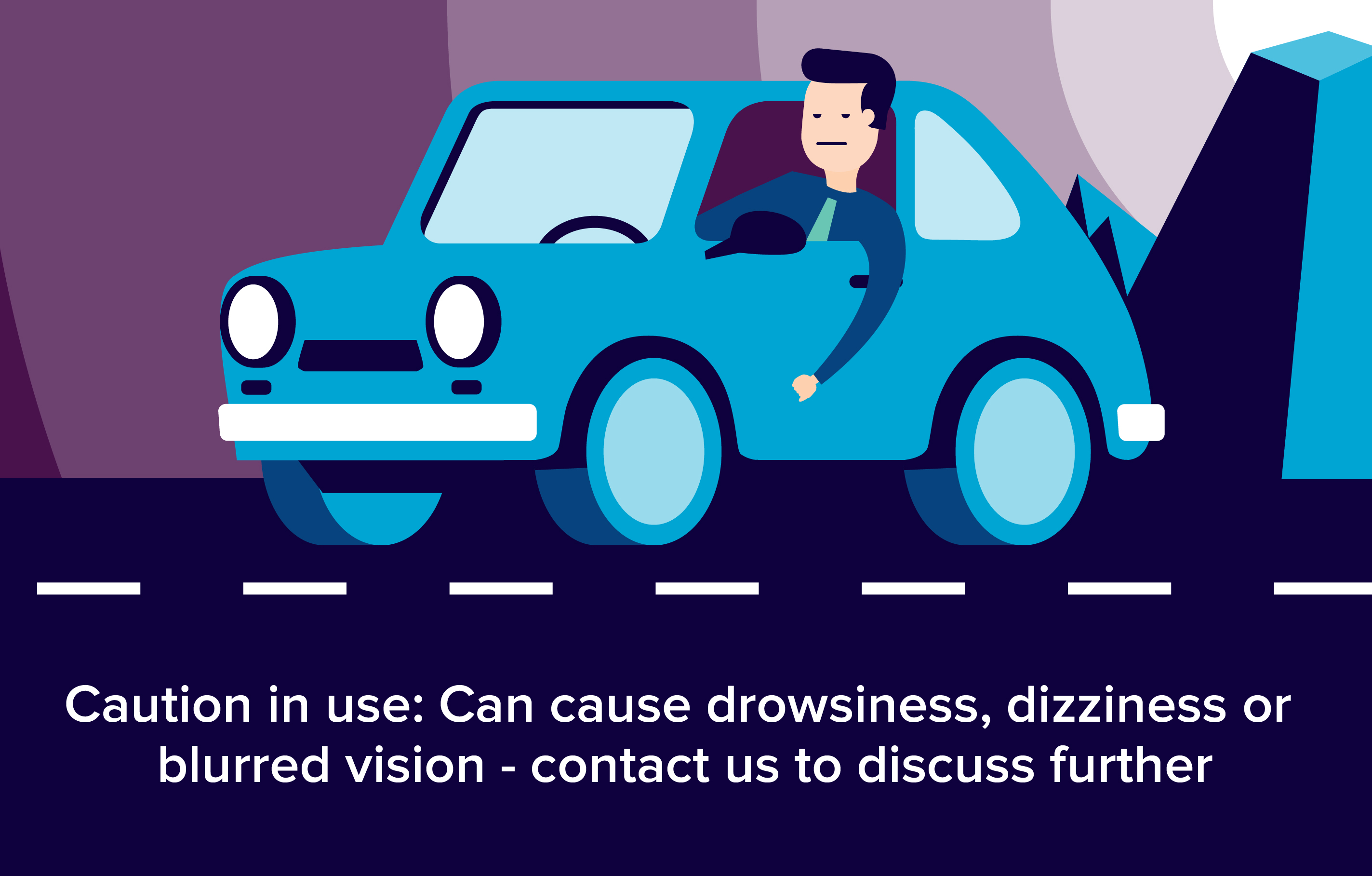Imipramine is used:
- to treat the symptoms of depression.
- for the relief of bed-wetting at night by children.

Why have I been prescribed Imipramine?
Imipramine is used:
- to treat the symptoms of depression.
- for the relief of bed-wetting at night by children.
How does it work?
- Imipramine belongs to a group of medicines called tricyclic antidepressant drugs.
- These medicines alter the levels of chemicals in the brain to relieve the symptoms of depression.
When and how do I take it?
Swallow the tablets with a glass of water.
What’s the dose?
Depression:
Adults:
- 25mg three times a day increasing to 150mg-200mg a day in divided doses.
- In severe cases (treated in hospital) the dose may be increased up to a maximum of 100mg three times a day.
- The usual maintenance dose is between 50mg and 100mg a day in divided doses.
Elderly (over 60 years):
- Initially 10mg a day increasing to 30-50mg a day.
Nightly bedwetting:
Children only, to be taken at bedtime (for no longer than 3 months and up to a maximum of 75mg a day):
- Over 11 years (35-54kg) - 50-75mg a day.
- 8-11 years (25-35kg) - 25-50mg a day.
- 6-7 years (20-25kg) - 25mg a day.
- Under 6 years - not recommended.
Could it interact with other tablets?
Please tell your doctor or pharmacist if you are taking or have recently taken any other medicines, including medicines obtained without a prescription. Especially:
- medicines to treat epilepsy such as barbiturates, phenytoin, carbamazepine, phenobarbital
- medicines called “benzodiazepines” such as diazepam, nitrazepam, oxazepam, alprazolam
- medicines to treat depression, such as selective serotonin reuptake inhibitors (SSRIs) such as fluoxetine, fluvoxamine
- disulfiram to treat alcohol addiction
- nicotine replacement therapy
- methylphenidate (used to treat attention deficit/hyperactivity disorder (ADHD))
- medicines to stop your blood clotting (eg warfarin)
- antihistamines (medicines to treat allergies)
- altretamine (to treat some types of cancer)
- apraclonidine and brimonidine (to treat glaucoma)
- baclofen (a muscle relaxant)
- painkillers such as nefopam, tramadol, codeine, dihydrocodeine
- medicines to treat some heart conditions such as diltiazem, verapamil, labetalol, propranolol, quinidine
- medicines to treat angina that you spray or dissolve under your tongue (eg glyceryl trinitrate “GTN”, isosorbide dinitrate)
- any medicines to treat high blood pressure such as guanethidine, debrisoquine, bethanidine methyldopa, reserpine, clonidine or diuretics (“water” tablets).
- medicines to treat some mental illnesses such as thioridazine, chlorpromazine
- cimetidine (to treat ulcers)
- entacapone or selegiline (to treat Parkinson’s disease)
- oral contraceptives (“the pill”) or hormone replacement therapy (HRT)
- appetite suppressants
- sympathomimetic medicines such as adrenaline (epinephrine), ephedrine, isoprenaline, noradrenaline (norepinephrine), phenylephrine and phenylpropanolamine (these may be present in many cough and cold remedies or local anaesthetics)
- ritonavir (to treat HIV).
What are the possible risks or side-effects?
Like all medicines, Imipramine tablets can cause side effects, although not everybody gets them.
Stop taking the tablets and contact a doctor at once if you have the following allergic reaction, pneumonitis (fever, chills, cough, difficulty breathing, unusual weight loss, feeling sick), a skin rash, which may be itchy, sensitivity to the sun or sun lamps, puffy, swollen face or tongue, which may be severe causing shortness of breath, shock and collapse.
Tell your doctor if you notice any of the following side effects or notice any other effects not listed:
Blood:
- reduction in some blood cells (you may experience a sore throat, mouth ulcers and recurring infections, bleeding or bruising easily)
Endocrine system and metabolism:
- disturbances in sexual function or sex drive
- breast swelling in men and women
- production or over-production of breast milk
- changes in blood sugar levels
- weight gain or loss
- SIADH (syndrome of inappropriate antidiuretic hormone secretion)
Brain and central nervous system:
- disorientation
- dizziness
- tiredness or sleepiness
- weakness
- headache
- difficulty concentrating
- confusion
- agitation
- mood swings
- aggressiveness
- difficulty sleeping
- delusions
- seeing things that are not there
- anxiety
- restlessness
- pins and needles
- tremour
- muscle spasm or lack of muscle control
- speech problems
- fits
- Anticholinergic effects (dry mouth, constipation, blurred or double vision, sweating, hot flushes, difficulty passing water (urine), dilation of the pupil of the eye, glaucoma and blockage of the small intestine)
Heart:
- feeling faint when getting up (postural hypotension)
- high or severely low blood pressure
- fast/racing heart
- palpitations
- irregular heart-beats
- changes in ECG readings
Stomach and intestines:
- feeling or being sick
- loss of appetite
- inflammation of the mucus membranes in the mouth
- tongue lesions
Liver:
- impaired liver function
- hepatitis
- including changes in liver function (as seen in blood tests)
- jaundice (yellowing of the skin and/or whites of the eyes)
Other:
- hair loss
- ringing in the ears
- small purple red spots
Withdrawal symptoms:
- feeling or being sick
- stomach pain
- diarrhoea
- difficulty sleeping
- nervousness
- anxiety
- headache
- irritability
Children:
- changes in behaviour.
Can I drink alcohol while taking it?
You are advised not to drink alcohol with this medicine.
What if I’m pregnant/breastfeeding?
Imipramine tablets should not be taken during pregnancy or if breast-feeding.
If you have any more questions please ask your Pharmacist.
Remember to keep all medicines out of reach of children
Please Note: We have made every effort to ensure that the content of this information sheet is correct at time of publish, but remember that information about drugs may change. This sheet does not list all the uses and side-effects associated with this drug. For full details please see the drug information leaflet which comes with your medicine. Your doctor will assess your medical circumstances and draw your attention to any information or side-effects which may be relevant in your particular case.
References:
https://www.nlm.nih.gov/medlineplus/druginfo/meds/a682389.html
https://en.wikipedia.org/wiki/Imipramine
http://www.drugs.com/cdi/imipramine.html
http://www.rxlist.com/tofranil-drug.htm

